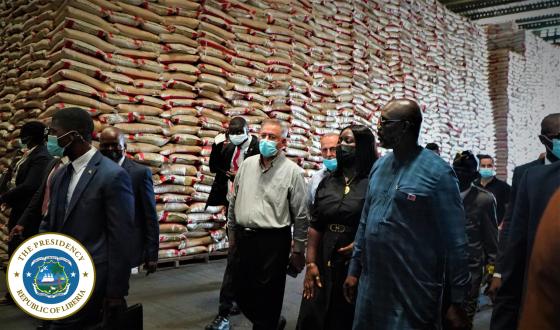Liberia: Rice Importers on Another Go-Slow Action?

Flashback: In April 2022, President Weah visited the warehouses of rice importers to ascertain rumors of rice shortage
It is apparently difficult for wholesalers in the commercial areas of Red Light and Waterside to get long grain parboiled rice from their suppliers, prompting them to raise their prices.
The long-grain 25kg parboiled rice was sold to retailers for US$13.00 and they, in turn, sold for US$14.00 (L$2,200) because they were not responsible for transporting the rice to their shops and stores. However, the price of parboiled rice has increased to US$18.50 (L$2,600).
This has also affected the most basic retail unit of the commodity, which is the sale of rice by cup, which is now sold for L$50 and L$60.
“We don’t know what is happening,” says Emmanuel Kortuu, a wholesaler, selling at Red Light. “Importers are refusing to sell to us. We sleep at the port. All they are saying to us is that they don’t have rice in stock, but we know that’s a lie because they are asking the government to increase their price to US$14.00 and the government has refused, so they are now hoarding their goods.”
He added that the government should be able to dialogue with these importers in order to address the situation so that people will not use the scarcity to inflate the price in order to generate huge profits.
The country’s major staple is rice. Even though there are other variations of the commodity, including butter rice and the broken rice on the market, Liberians prefer long grain rice.
When George Weah became President in 2018, he met with rice importers to dialogue on the price of the commodity. “I am ready to work with you and resolve all of the issues that underpin the galloping price of rice so that our people will afford to buy,” he said.
Despite this, it appears that importers are underplaying the president’s appeal. Sometime last year, there was an increment in the price of rice. Additionally, there was another rise this year, which prompted the president to pay an announced visit to several warehouses at the Freeport of Monrovia and guarantee that the price of rice would never increase.
Information gathered around markets yesterday revealed that importers are pointing to the rise in the global price of rice and the high tax at the Freeport as justification of the need to hike the price of the commodity above the government's preference of US$13.00. However, importers claim that the government has downplayed their request so they are left with no option but to hoard their goods in order to pressurize the government to agree to their demand.
Additionally, importers did not sell a set quantity to them; however, they are now only selling 10 to 20 bags to individuals on the grounds that they must purchase additional items like toothpaste and power pack milk.
Zoom Donzo, Public Relations Officer for the Rice Importers Association, disputed the allegation. He says that rice is limited because importers bring in new goods.
Tenneh Kemue, who sells at Red Light market, asserted that for Liberians to have access to their staple food, the government must work with importers. “We, Liberians, our staple food is rice, so if the importers are saying the price of rice has increased on the whole market, let the government have a dialogue with them.”
Because of this situation Amaduo Dialo, who sells at Waterside, is now selling a bag of rice for L$2,500. “Three days, I couldn't find rice. It was yesterday [that] I was lucky to get ten bags and I had to transport it myself. I paid $L70 as transport for one bag.” He narrated that other wholesalers were surprised last week when importers started selling only twenty bags at a time to individuals who now had to stand in long lines or even sleep at the port.
Marie Kollie, who sells at Waterside, noted that it is currently quite challenging to obtain rice from the port, prompting some retailers to sleep at the port to secure their place in line. “We are now buying rice from importers for US$14.50 and selling for L$2,600 because of the difficulties in getting the rice. We pay L$50 per bag for transportation.”
Kollie is suggesting that the government agree to the importers’ demand or reduce the taxes on rice. She says they are compelled to add an additional US$3 on the rice in order to meet their expenses.
